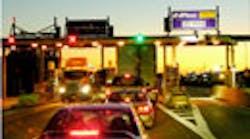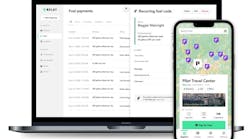The debate over whether or not to boost highway tolls in order to generate more money for transportation infrastructure projects continues to deepen based on a new poll as well as commentary from one of the major global rating agencies.
According to a recent poll, a majority of Americans apparently favor “user fees” in the form of roadway tolls versus increased fuel taxes as the best way to pay for new transportation projects.
The Reason-Rupe poll – conducted by NSON Opinion Strategy on behalf of the Reason Foundation and the Arthur N. Rupe Foundation – surveyed a random, national sample of 1,200 adults by phone in early December and found 77% oppose increasing the federal gas tax, which is currently 18.4 cents a gallon, to pay for transportation infrastructure projects.
Some 65% of those polled said government spends transportation funding ineffectively, with 58% saying new roads and highways should be funded by those that drive on them through tolls.
Interestingly, if using a toll road would save drivers a “significant” amount of time, 59% of those surveyed said they would pay to use it. And 57% favor converting carpool lanes, or high-occupancy vehicle (HOV) lanes, into high-occupancy toll (HOT) lanes.
However, those polled are much-less supportive of variably-priced toll lanes, with half of those surveyed opposing tolls that rise and fall with traffic levels.
In terms of transportation spending priorities, the Reason-Rupe poll found 62% of those surveyed want to prioritize funding for road and highway projects, while 30% want mass transit projects to be at the top of the list.
However, Fitch Ratings released commentary last week warning that ad hoc toll increases in the U.S. could put downward pressure on state revenues over time – and could have ratings implications as well.
“On one side, we see states that require greater revenues to fund the maintenance and improvement of their infrastructure in the face of declining federal revenues and have few options other than raising tolls to do so,” noted Cherian George, managing director of Fitch’s global infrastructure group, in a recent wire brief.
On the other, however, George pointed to growing pushback against tolling efforts, especially the Commuter Protection Act recently introduced by Sen. Frank Lautenberg (D-NJ) – a bill that would transfer tolling power away from the states to the Dept. of Transportation (DOT).
“We believe that both sides have valid concerns,” Fitch’s George said. “Tolls are reliable when used to fund financial needs. However, their ad hoc use could raise credit concerns. There is the potential for downward pressure on both mobility and the economy and it could limit the ability of public agencies to develop infrastructure. Reprisals that increase these risks may already be underway.”
The global rating agency believes a “clear national policy” could bring balance to the two sides by managing the implementation of tolls and allowing states to generate the stable revenue streams they require to address highway infrastructure needs.




